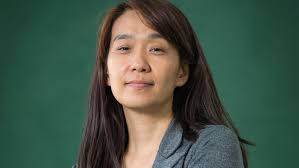By Matters India Reporter
Stockholm, Oct 11, 2024: The 2024 Nobel Prize in Literature was awarded to South Korean author Han Kang “for her intense poetic prose that confronts historical traumas and exposes the fragility of human life.”
Mats Malm, permanent secretary of the Swedish Academy’s Nobel Committee, announced the prize in Stockholm on October 11.
Malm said he was able to talk to Han by phone after announcing her as the winner. “She was having an ordinary day it seemed – had just finished supper with her son. She wasn’t really prepared for this.”
The Nobel Prize on its X handle said that Kang’s work is “characterised by this double exposure of pain, a correspondence between mental and physical torment with close connections to Eastern thinking.”
Nobel committee chairman Anders Olsson praised her “physical empathy for the vulnerable, often female lives” of her characters.
“She has a unique awareness of the connections between body and soul, the living and the dead, and in her poetic and experimental style has become an innovator in contemporary prose,” Olsson said.
The Nobel Prize committee added: “In Han Kang’s short story (2012; ‘Europa’, 2019), the male narrator, himself masked as a woman, is drawn to an enigmatic woman who has broken away from an impossible marriage. The narrative self remains silent when asked by his beloved: “If you were able to live as you desire, what would you do with your life?” There is no room here for either fulfilment or atonement.”
Anna-Karin Palm, a committee member, said Han writes about “trauma, pain and loss”, whether individual or collective, “with the same compassion and care” and called her lyrical prose “both tender and brutal”.
The 2023 prize went to Norwegian author and dramatist Jon Fosse, who was honoured for “his innovative plays and prose, which give voice to the unsayable”.
The literature prize has long been male-dominated. The last woman to win was Annie Ernaux of France, in 2022.
The first South Korean to win the literature prize said she would ‘celebrate it quietly’ and have tea with her son.
The 53-year-old literary figure won the International Booker Prize in 2016 for “The Vegetarian,” an unsettling novel in which a woman’s decision to stop eating meat has devastating consequences.
Han Kang was born on November 27, 1970 in Gwangju as the daughter of novelist Han Seung-won. As a child she and moved to Suyuri in Seoul, the national capital. Her brother Han Dong Rim is also a writer.
She currently teaches creative writing at the Seoul Institute of the Arts.
In an interview with The Guardian newspaper Han Kang said she knew she wanted to be a writer at 14. “I was looking for answers to fundamental questions. And then, as a reader, I realized every writer is seeking answers and they don’t have any conclusions, but they’re still writing. So, I thought why don’t I do that too,”
Han has won the Yi Sang Literary Prize, Today’s Young Artist Award, and the Korean Literature Novel Award. She won the 25th Korean Novel Award for her novella Baby Buddha in 1999, the 2000 Today’s Young Artist Award, the 2005 Yi Sang Literary Award for Mongolian Mark, and the 2010 Dong-in Literary Award for Breath Fighting.
In 2018 Kang became the fifth writer chosen to contribute to the Future Library project.
She was elected a Royal Society of Literature International Writer in 2023.
Since 1901, a total of 116 Nobel Prizes in Literature have been awarded. Of these, four have been shared between multiple laureates. So far, 17 women have received this prestigious literature prize.
The prize carries a cash award of 11 million Swedish kronor ($1 million) from a bequest left by the award’s creator, Swedish inventor Alfred Nobel. The laureates are invited to receive their awards at ceremonies on Dec. 10, the anniversary of Nobel’s death.
Last year, Norwegian author Jon Fosse was awarded the Nobel Literature Prize “for his innovative plays and prose which give voice to the unsayable.”











Hearty congratulations to South Korean author Han Kang.